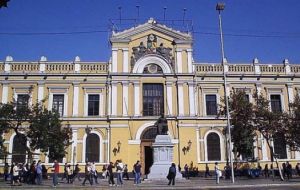MercoPress. South Atlantic News Agency
Chilean students end some school occupations but pledge to continue protests
 The emblematic main building of Universidad de Chile was returned to the authorities
The emblematic main building of Universidad de Chile was returned to the authorities Students have voted to end occupations at two of the most symbolic institutes of Chile’s public education system, but have vowed to continue demonstrations after months of protests have failed to achieve significant reforms to the country highly privatized, class based education system.
Students on the eve of Christmas began cleaning up the Casa Central (Central House) of the Universidad de Chile in the heart of downtown Santiago after nearly seven-month-long “toma” or takeover.
They took down the enormous banners that turned the historic building’s facade into an ever-changing mural, pulled off the hood of that covered the face of the statue of university founder Andrés Bello, and began removing the possessions of students who have maintained a constant presence on site for over half a year.
Their move was a significant one as the Casa Central had been the country’s focal point of the student movement, serving as a forum for ideas and discussion and a place where the student movement interacted with the general public. Street lectures and concerts were held in front of the building and radio programs broadcast from inside, including the popular “cultural barricade” show, which interviewed passers-by and gave them free books.
But all that came to an end when representatives of the Fech, the university’s student federation, officially relinquished the building to university authorities after students decided to end the “toma” and initiate new forms of protest.
“The leadership council of the Fech decided to end the occupation of the Casa Central and return it to the administration of the entire community,” said the new Fech president Gabrile Boric, “so that repairs, dating back to the [February 2010] earthquake, can be made.”
Fech representatives - including vice president Camila Vallejo, who was recently voted “person of the year” by readers of The Guardian - reached an agreement with university dean, Víctor Pérez. The building will now go through a period of repairs that have been pending since the devastating 8.8-magnitude earthquake of 2010.
Boric stressed that the hand-over of the building did not signal the end of Chile’s student movement, but was rather the beginning of a new phase of demonstrations.
“This doesn’t mean that the student movement is over,” said Boric. “There are still many issues pending. The demands that we have made as a student movement were not achieved this year. From here and into the future, the Casa Central will be open for different activities and to continue with demonstrations, but always open to the community.”
Meanwhile Chile’s most prestigious public high school, Instituto Nacional, also voted to end its occupation this week, which lasted 195 days.
“It was no longer an effective instrument of pressure,” said José Soto, president of the school’s student group.
After opening its doors to the public, the school was inspected by Santiago Mayor Pablo Zalaquett and school principal Jorge Toro.
Toro described the school as “unpresentable” and accused the protesters of “having no love for the school” announced that students who caused damages would be identified and have their enrolment “examined”.
Mayor Zalaquett said that he would not ask for money from the Education Ministry unless the whole school community agreed to undertake a public commitment to take care of the school.
The mayor said that he would review school admissions for 2012, saying, “I can’t open the school to admissions that will allow what happened this year to repeat itself, in the most emblematic public school in Chile, were young people and their families’ dream of studying.”
The school’s student group agreed to help pay for repairs, but president Soto denied that the ending of the “toma” was a blow for the student movement.
“If this is a defeat, it is a defeat for the whole country,” he said.
The end of occupations of the Instituto Nacional and the Casa Central of the Universidad de Chile comes as high school representatives announced that 70 schools around the country would remain in “toma” over the school holidays.
In the district of Instituto Nacional, Santiago Central, eight of 16 public high schools remain in “toma.”
The students marked the end of the year’s demonstrations with a Christmas-themed protest in Plaza de Armas, Santiago, when students of the Universidad de Chile handed “Santa Claus” a letter asking for a better education.
“The government is not listening,” read a Fech communiqué, “so we have to ask for our dream [of quality education] from Santa.”
By Joe Hinchliffe - The Santiago Times




Top Comments
Disclaimer & comment rules-

Read all commentsIs no one listening to the wants of Chilean young.Not here or in government?
Dec 29th, 2011 - 10:36 am 0Commenting for this story is now closed.
If you have a Facebook account, become a fan and comment on our Facebook Page!